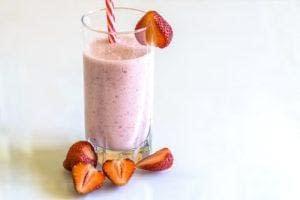
Deluding yourself is usually not a good thing… except when it’s a good thing. A 2011 study conducted at Yale, found that perception of calorie intake influences the body’s hormonal and metabolic response to calorie intake. Check out my YouTube Video on the study, or just keep reading!
The study administered a 380 calorie milkshake to 46 participants, in two separate sessions. The participants were told they were evaluating two milkshakes of different calorie and nutrition profiles, to ascertain how they “tasted.” Half of the time, the participants thought they were drinking a 620 calorie “Indulgent Shake.” The other half of the time, the participants thought they were drinking a 140 calorie “Sensible Shake.” Now here’s the thing: throughout the ENTIRE study, the participants ONLY consumed the original, 380 calorie milkshake. It was the same milkshake the ENTIRE time. Yes, they were lied to. (The amount of lying that goes down in scientific studies is kinda crazy. If I’m ever a participant in one, I’ll probably be super obnoxious and be like “But really?”… after everything.)
So what happened? When the participant’s consumed the 620 “Indulgent Shake,” their ghrelin levels quickly dropped. On the contrary, when they consumed the 140 calorie “Sensible Shake,” their ghrelin levels were barely affected, if at all. Ghrelin, known as the “hunger hormone,” is secreted by the stomach, and influences your level of satiety. When your stomach is empty, ghrelin levels rise, making you feel hungry. After eating, ghrelin levels drop, making you feel full, and jumpstarting your metabolism.
THE TAKEAWAY
When the participants thought they were drinking a higher calorie drink, they literally got fuller faster, encouraging a consequential rise in metabolism. On the contrary, when they thought they were drinking a lower calorie drink… they stayed hungry.
The study also gives a nice summary of other mind/body tricks:
“Studies of food expectancies suggest an important role for a person’s mindset in determining taste and preference. For instance, people like the taste of Coke better when it is consumed from a brand-name cup (McClure et al., 2004); strawberry yogurt and cheese spreads are enjoyed less if they are labeled “low-fat” (Wardle & Solomons, 1994); adding vinegar to beer under the labeling “special ingredient” can actually improve taste ratings (provided the consumer is unaware that the “special ingredient” is vinegar; Lee, Frederick, & Ariely, 2006); and manipulating the perceived cost of wine to be more expensive (but not the wine itself) can result in heightened activity in the medial orbital frontal cortex, the pleasure center of the brain (Plassmann, O’Doherty, Shiv, & Rangel, 2008).”
So no…. a calorie is not just a calorie. It also matters what you think about calories. Oh hey!

